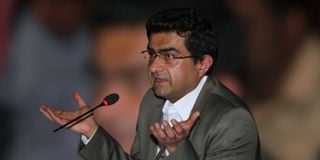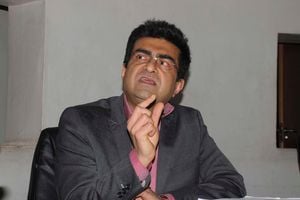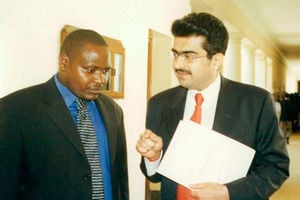
Businessman Kamlesh Pattni.
Many a globetrotter transiting through the Jomo Kenyatta International Airport will likely have made a purchase or two at one of the Suzan Duty Free outlets in East Africa’s biggest aerodrome.
Unknown to them, that purchase could have helped Kamlesh Pattni launder a dollar or two, after plundering millions from the Zimbabwean taxpayer.
At least, that is the strong belief of the US and UK governments, which on Monday placed sanctions on Mr Pattni and 27 other individuals and companies they believe have been running a gold smuggling and money laundering operation out of Zimbabwe.
Mr Pattni’s Suzan General Trading JLT, the UAE-registered firm that owns the Suzan Duty Free brand in Kenya and other countries, is among 21 companies that the US government has sanctioned.
Mr Pattni has found himself in global infamy at both ends of the last three decades, on account of two multimillion-dollar scandals in two countries, but built from the same blueprint.
Other individuals sanctioned alongside Mr Pattni are his brother-in-law Mukesh Mansukhlal Vaya, nephew Mishaal Hitesh Pattni, suspected right-hand man Sanjay Keshavji Vaya, Raj Vaya Sanjay, Rahul Sood, David Paul Crosby and Dmytro Abakumov.
Between 1991 and 1993, Mr Pattni, his brother-in-law Mukesh Mansukhlal Vaya and several other individuals colluded with senior Kenyan government officials to take advantage of a programme intended to encourage mineral exports.
Under the programme, companies that exported gold would get monetary rewards from the government.
Goldenberg International, under the control of Mr Pattni and Mr Vaya, barely exported any gold but received Sh5.8 billion as part of the programme.
A commission of inquiry led by Justice Samuel Bosire concluded in October, 2005 that Kenya lost at least Sh27 billion.
“The figures do not at all represent every loss, but merely a minimum of what the country lost through the Goldenberg scam,” the Justice Bosire report stated.
The latest allegations mirror a theft scheme in Kenya between 1991 and 1993, in which Mr Pattni was accused of using Goldenberg International to steal from taxpayers, after collaborating with powerful political figures.
During public inquests, former President Daniel Arap Moi was mentioned as one of the powerful politicians that facilitated payments in billions to Goldenberg International and its subsidiaries.
On Monday, the Office of Public Affairs, a department under the US Treasury, said in its statement that Mr Pattni had exported the fraud scheme to Zimbabwe, where he has allegedly minted billions with the help of close business associates and bribed government officials.
The UK also announced that it has placed sanctions as it takes a fresh battle to the doorstep of gold smugglers.
“Pattni is being designated pursuant to E.O. 13818 for having materially assisted, sponsored, or provided financial, material, or technological support for, or goods or services to or in support of corruption, including the misappropriation of state assets, the expropriation of private assets for personal gain, corruption related to government contracts or the extraction of natural resources, or bribery,” the statement from the US Treasury reads in part.
“Kamlesh Pattni is an involved person within the meaning of the Global Anti-Corruption Sanctions Regulations 2021 on the basis of the following ground: Pattni is or has been involved in being responsible for or engaging in serious corruption. Specifically, Pattni has been responsible for and engaging in serious corruption, namely bribery, in support of his illicit gold trading enterprises,” the UK government states on its sanctions list.
The US believes that after Mr Pattni relinquished his assets, including the Grand Regency and duty free shops at the JKIA, to the Kenyan government in exchange for freedom from prosecution, he fled to Zimbabwe and found a new friend in President Robert Mugabe.
Mr Mugabe and other government officials allegedly helped Mr Pattni build a crime empire similar to the one that had fallen in Kenya.
The US in its statement said that atop of Mr Pattni’s illicit venture is Sun Multinational DMCC, a company registered in the United Arab Emirates.
One of his associates in the sanctions list, Swetang Sinha, allegedly identified Mr Pattni as the company’s CEO.
Ms Sinha has incorporated several Sun Multinational subsidiaries, which Washington DC holds are used to launder the Zimbabwean loot.
The US document links Mr Sinha to corruption involving Zimbabwe President Emerson Mnangawa.
Sun Multinational is wholly owned by Marwa Investments, also registered in the UAE. Mr Pattni’s brother-in-law Vaya owns Marwa Investments.
Another associate in the sanction list, Rahul Sood, is listed as a manager in several companies under the Pattni network.
Some of the companies under the Sun Multinational chain are Fiza Gold and Bullion Trading LLC, Golden Luxury Jewellery Trading LLC, Memories Golden Jewellery LLC, Ruhmeer Diamonds DMCC and Sun Star Travel & Tourism LLC.
Mr Sood and Mr Pattni’s nephew, Mishaal Hitesh Pattni, are officials or employees in the UAE-registered subsidiaries under Sun Multinational, the US argues.
The US dossier does not specify how much money Mr Pattni and his associates have allegedly siphoned from Harare.
But the documents indicate that he used 21 companies in Zimbabwe, Kenya, UAE, Kyrgyzstan, Singapore and the UK to launder the loot.
“Pattni and members of his network engaged in a scheme wherein they would generate cash via the sale of Zimbabwean natural resources in foreign jurisdictions. When Pattni and his network would return to Zimbabwe with the cash from the sale of the natural resources, they would overreport the amount of cash being brought back into the country, receive compensation on the overreported cash, and bribe government officials in Zimbabwe to receive protection for their illicit activity,” the press release from the US Treasury states.
The 21 sanctioned companies have made the US list on account of being owned, controlled or having acted in support of Mr Pattni’s alleged activities.
In 2023, Al Jazeera journalists posing as Chinese criminals looking to launder money got an offer from Mr Pattni.
Mr Pattni suggested that they transport hard cash to Harare, which he would then declare as proceeds of gold sales.
The declared sales would then be used to buy gold bars that would be shipped to another of Mr Pattni’s companies in Dubai, which usually buys the precious metal.
In that chain suggested by Mr Pattni to the journalists, the dirty money would come out on the other end, looking like it was proceeds of a legitimate gold trade deal.









